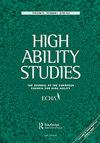个人项目还是合作项目?影响高推理能力学生和同龄学生偏好的因素
IF 1.8
4区 教育学
Q2 EDUCATION, SPECIAL
引用次数: 3
摘要
摘要调查了影响328名学生(6-8年级)在具有挑战性的项目中合作或单独工作的偏好的条件,以及他们与能力、年级和性别的潜在互动。每个学生都完成了认知能力测试(中七)和项目情境调查。没有发现个人或合作项目的总体偏好。学生的偏好对环境特征(主题、任务性质和社会动态)很敏感。艺术领域的个人项目优先,科学和社会研究领域的共享项目优先。能力强的学生和男孩更喜欢数学方面的个人项目。主成分分析显示,三个情境因素影响了学生独自完成项目的愿望(享受、优化结果和风险管理),五个因素影响了合作的吸引力(包容性和信任、获得他人优势、他们对支持的感知需求、熟悉度和公平评估)。高能力的学生更关心他们工作的效率和质量,以及他们的成绩,而其他同龄人则更受乐趣潜力的影响。八年级学生比年轻学生更关心风险管理和评估过程。如果他们寻求的安全、支持和公平的合作条件不可用,学生们的默认偏好是独自完成一个具有挑战性的项目。本文章由计算机程序翻译,如有差异,请以英文原文为准。
Individual or collaborative projects? Considerations influencing the preferences of students with high reasoning ability and others their age
ABSTRACT Conditions influencing 328 students’ (Grades 6-8) preferences for collaborating or working alone on challenging projects were investigated, as well as their potential interactions with ability, grade and sex. Each student completed the Cognitive Abilities Test (Form 7) and Project Context Survey. No overall preference for individual or collaborative projects was found. Students’ preferences were sensitive to features of the context (subject, nature of the task and social dynamics). Individual projects were preferred in art and shared projects in science and social studies. Students with high ability and boys preferred individual projects in Math. Principal components analyses revealed three contextual considerations influenced students’ desire to work on projects alone (enjoyment, optimizing the outcome, and risk management) and five influenced the appeal of collaborating (inclusiveness and trust, access to the strengths of others, their perceived need for support, familiarity, and fair assessment). High ability students were more concerned with the efficiency and quality of their work, and their grades while others their age were more influenced by the potential for fun. Grade 8 students were more concerned with risk management and the assessment process than younger students. If the safe, supportive, fair conditions they sought for collaborating were not available, students’ default preference was to work alone on a challenging project.
求助全文
通过发布文献求助,成功后即可免费获取论文全文。
去求助
来源期刊

High Ability Studies
Multiple-
CiteScore
4.80
自引率
11.10%
发文量
7
期刊介绍:
High Ability Studies provides a forum for scholars in a variety of disciplines associated with the development of human abilities to their highest level. It is a medium for the promotion of high ability, whether through the communication of scientific research, theory, or the exchange of practical experience and ideas. The contents of this journal are unique in reflecting concerns and recent developments in this area from childhood and across the whole life span in a variety of contexts. Far from being restricted to the traditional focus on high-level cognitive development, it also presents investigations into all other areas of human endeavour, including sport, technology, the arts, business, management and social relations.
 求助内容:
求助内容: 应助结果提醒方式:
应助结果提醒方式:


